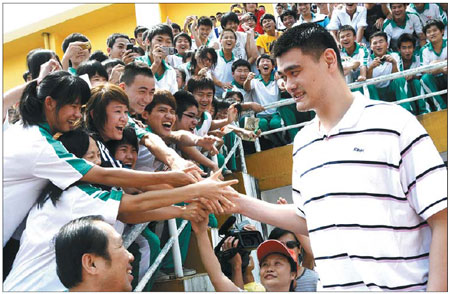News
Hu calls for cooperation
By Li Xing and Wu Jiao (China Daily)
Updated: 2011-04-16 07:36
 |
Large Medium Small |
|
 Yao Ming is cheered by his fans at a sports school in Qionghai, Hainan province, on Friday. The Houston Rockets center attended a roundtable meeting for youth leaders at the Boao Forum for Asia, which opened on Thursday. Peng Tong / for China Daily |
BOAO, Hainan - Chinese President Hu Jintao on Friday called for "open regionalism" and proposed "a new security concept" to help shelve differences.
| ||||
"(All countries should) adhere to open regionalism and respect the presence and interests of countries outside the region in Asia," Hu said at the opening ceremony of the forum held in South China.
The remarks come as Asia is increasingly seen as a major engine of world economic growth. Some countries, including the United States, have become increasingly engaged in Asian affairs in recent years, which some people perceive as a counterweight to the rise of China in the region.
"China welcomes the active participation of all countries, including the BRICS countries, in the cooperation process in Asia so that together we will make Asia more peaceful, stable and prosperous," Hu said.
BRICS refers to the five developing economies of Brazil, Russia, India, China and South Africa.
It was the third time Hu has attended the regional gathering, a non-government platform for global political, business and academic leaders.
As the forum celebrates its 10th anniversary, Hu said it has grown into one of the major influential forums in the world.
A number of leaders of countries both in and outside Asia were present at Friday's opening ceremony, including Russian President Dmitry Medvedev, Brazilian President Dilma Rousseff, South African President Jacob Zuma, Republic of Korea Prime Minister Kim Hwang-sik, Spanish Prime Minister Jose Zapatero and Ukrainian Prime Minister Mikola Azarov.
Underscoring the progress Asia has made in economic and social development, Hu said the region also endures "intermittent regional hotspot issues and a multitude of traditional and non-traditional security challenges".
Hu also proposed a new security concept defined by mutual trust, equality and coordination instead of a "Cold War mentality and zero-sum approach".
"Cold War mentality" often refers to perceptions of China as a threat by some in the West.
While emphasizing dialogue and coordination, he said countries should shelve their differences and seek common ground.
Hu said China "will play a constructive role in resolving regional hotspot issues and take an active part in various forms of regional security dialogue and cooperation in order to preserve a regional environment conducive to peace and development in Asia."
The region has been beset in recent years by tension on the Korean Peninsula and differences between China and some neighboring countries on maritime claims.
"China will remain committed to seeking peaceful solutions to disputes with neighbors over territory and maritime rights and interests through friendly negotiations," Hu said.
"We will always place Asia on top of our diplomatic agenda," he said.
Hu also mapped out key tasks to be achieved by the Chinese government in the next five years :
Government tasks
Boosting domestic demand, effectively unleashing potential consumption, following a more proactive opening-up strategy, promoting basic balance of trade, providing opportunities for countries in Asia and the rest of the world to increase exports to China;
Pursing the strategy of "going global", encouraging enterprises of different ownership structures to invest overseas, investing more in Asia and the emerging markets, giving more economic assistance to developing countries in Asia;
Participating in global economic governance and regional cooperation, pushing for reform of the global economic and financial systems;
Building a resource-conserving and environment-friendly society, balancing economic and social development with population, resources and the environment.
| 分享按钮 |



